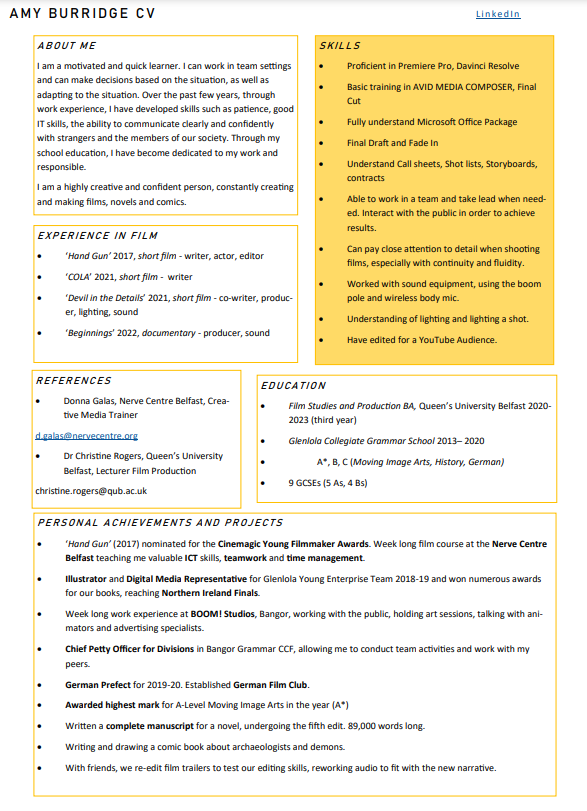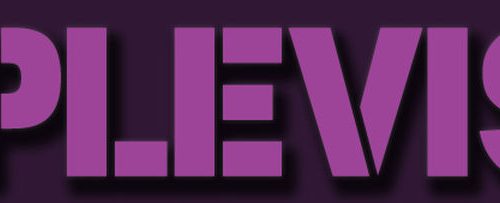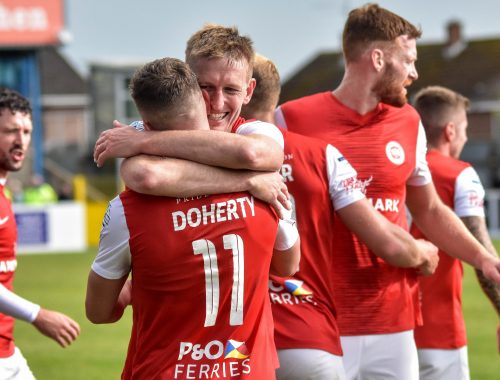Hear Back From You Never
New experiences always were hard to get used to, of course they would be. You’ve never done it before; it’s normal to feel on edge when asking big, scary companies to cast a glance to little old you – you who’s new to the field, little experience and bumbling their way through asking for a placement. For this method of reflecting, I will be using Boud’s model as it allows me to identify what happened, the results of it and how it changed my modes of going forwards. It allows me to properly examine and reflect upon my experiences and turn it into a learning opportunity.

The List
Mid Summer.
The list sat in front of me.
Rows upon rows of possible work placements before my eyes, their email addresses so neatly in a line. I looked at the names, dragging their names across to a new google tab to learn more about the companies. I wanted to be specific, methodical in my choices, present the best version of myself to these film companies in hopes to win them over and secure a place there. So I researched, I drafted up an email and asked if they were looking. I was nervous, anxious about sending the email, but, naively, I was hopeful. I sent the email and shut the laptop over.
Days passed, I was beginning to get nervous that they hadn’t responded. I waited for the notification of a reply, but nothing came. I was confused, surely I should have heard something, even if it was a rejection. I opened Outlook and my worst fear appeared. I was logged out. I hadn’t received the email because I wasn’t receiving any emails. A security measure to ensure I wasn’t hacked, but it couldn’t save me from disappointment. There it sat. Four days old.
“Thanks for getting in touch. Please send your CV through and why you would like to work with us.“
Hastily, I scrambled to reply. I sent them my CV and my reasonings, but it was too late. I missed my chance. I never heard back from them.
I should have been checking every day manually instead of waiting for the notification. It was stupid, but it taught me that I needed to be more alert with this. If I wanted to prove myself to be a valuable asset to the team, if I really want to show I want to work with them, I had to be more on top of things.
First the Worst, Second the Best – or so it goes
Disheartened over failing to secure a place, I did not let it get me down too much. It is necessary to fail, after all, I need to learn what went wrong and how it went wrong if I want to know how to not fall into the same mistakes twice. It allows me to identify key areas that worked and failed. This lead me to my next attempt at applying. It was a firm that I tried getting work experience from back in school, yet they never replied to me. This time around, I was more successful. They emailed back and within the hour, I had responded, sending off my email and a detailed explanation of why I want to work there.
I was optimistic, I was thorough in my reasoning and even included works of theirs I enjoyed. Soon, I was checking my emails constantly to see their reply. Days passed. Outlook had been opened probably two hundred times.
Nothing.
And that’s when the email came through. It was the university explaining how to make a good CV.
The Dreaded CV
It became clear very quick that what was losing me the place was the CV. A plain white word document with my school subjects and such may have worked for a retail job, but for film? It was an insult. Aren’t I supposed to be creative? How does a boring, bland word document even begin to portray my creativeness?
It needs to be creative (2010:11). Stand out. Present the best me. So with thorough research, I began to craft my new and improved CV. I cut irrelevant information in favour of listing my filming achievements, I listing my editing skills and highlighted the film club I had established in school. Now it was looking like a better, more tailored CV. For each company I applied to, I made sure to change where necessary.

Along Comes the Fabled Hero

I was applying to a number of companies with my new email, but they were looking for more experienced film makers, not someone fresh from school and no real working experience. It was sad but I powered through.
The summer nights became longer, the sun set faster, and I was still without placement. Until an email came back.

“It would be great to have a chat with you.“
Claire, from Cinemagic, and I began talking back and forth. I explained my skills and we arranged for a phone call. But before that call, there was a volunteering opportunity at the museum. I had a driving lesson on that day, but I knew if I wanted to make a good impression, if I wanted to prove that I wanted to work with them, then I would volunteer.
I met a lot of the team that day, I helped take names and run the event and by the end of it, everyone told me it was great to meet me and they hope I could find a hundred hours with them.
We called. I explained my CV and German film club. And with that, I was sent forms to fill in.
For role as intern.
I had secured a placement after dozens of rejections and ignored emails. Finally, after everything I learnt, it proved a success.
Bibliography
https://www.open.edu/openlearn/mod/oucontent/view.php?id=51386§ion=4
Knott, A.M. and Posen, H.E., 2005. Is failure good?. Strategic Management Journal, 26(7), pp.617-641.
Cole, J. and Whistance, D., 2010. Creative CV guide. University for the Creative Arts.
Boud, D., Keogh, R. and Walker, D., 2013. Promoting reflection in learning: A model. In Reflection: Turning experience into learning (pp. 18-40). Routledge.
An Actors Guide to Online Marketing
Finding My Placement!
You May Also Like

Securing My Placement: The Humbling Experience of Film Industry Rejection
24 November 2022
Football: A Marketing Tug of War
25 November 2022
